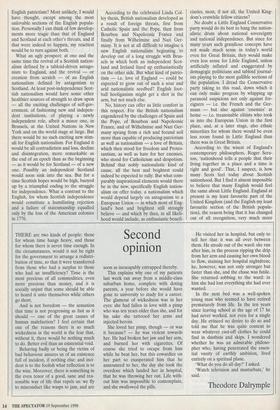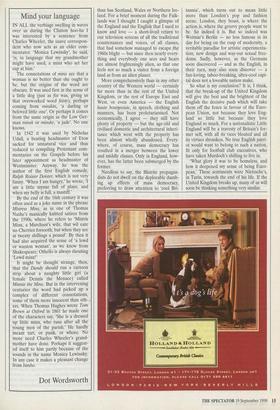ENGLAND DON'T ARISE!
UNLESS some latter-day Edward Gibbon gets in quickly with the Decline and Fall of the British Empire it will be time for him to turn his mind to a much more topical theme: the decline and fall of the United Kingdom itself. Quite possibly the second development is going to happen so quickly that it will make only a postscript to the first, under some such title as The Devolu- tion of Mr Blair. What then? Will that be the end of history so far as the English people are concerned?
Of course this is to jump the gun. Scot- tish devolution may not lead directly to Scottish independence, and the Good Fri- day agreement may not lead directly to a united Ireland — not at any rate in theory. But in practice both developments should now be regarded as pretty well a foregone conclusion, with Wales just possibly soon following down the same slippery slope. Then England will indeed 'stand alone', as it did, according to legend, after the fall of France in 1940. That is known, of course, as England's finest hour, and there are some who feel that the break-up of the United Kingdom may herald a comparable English renaissance. Just as the English felt a great surge of pride in 1940 when rid of their allies, so will they feel the same when rid of their compatriots.
Wishful thinking, in my view. The break- up of the United Kingdom will deal a far more profound blow to the English psyche than the break-up of the Empire ever did. Whereas the loss of empire was like the loss of a glorious bit of clothing, the loss of Scotland would be like the loss of a leg. Certainly that would be my own reaction, for at school I absorbed Robbie Burns quite as much as Shakespeare, Walter Scott quite as much as Dickens, and glo- ried in the heroism of Robert the Bruce and William Wallace quite as much as that of the Black Prince or Henry V. Nor is it just accident that we always refer to the British army rather than to the English army. How could it be otherwise when in every famous picture of a post-Union bat- tle — Waterloo, for example — Scottish regiments are always in the forefront? In my imagination, at any rate, Scotland and England are inextricably intertwined, and the idea of separating my love for the one from my love for the other is wholly abhor- rent.
Those, therefore, who speculate about the possibility of quickly replacing British patriotism with a new and more positive English patriotism seem to me dangerously wide of the mark. In time — 100 years hence, say — that might happen, but it will take generations to eliminate the Scottish genes from the English body politic. Nationalism, however, is quite another matter, the difference being, of course, that whereas patriotism arises out of love of one's own country, nationalism arises out of hatred for other peoples', and with the stuff of nationalism a newly liberated Eng- land might indeed be more than well endowed. That is the trouble. One can all too easily imagine the Sun newspaper mak- ing bad blood between the English and the Scots — rather as it now does between the English and the French — thereby soon replacing mutual affection with mutual antagonism. Indeed this is pretty well bound to happen, which is why devolution can hardly fail to lead to full independence.
But will a tabloid-led English nationalism arising out of these fresh antagonisms accelerate the process of invigorating any- thing that can properly be called a positive English patriotism? Most unlikely, I would have thought, except among the most unlovable sections of the English popula- tion. Personally I can think of few develop- ments more tragic than that of England and Scotland at each other's throats, and if that were indeed to happen, my reaction would be to turn against both.
What an ugly prospect: at one and the same time the revival of a Scottish nation- alism defined by a tabloid-driven antago- nism to England, and the revival — or creation from scratch — of an English nationalism defined by antagonism to Scotland. At least post-independence Scot- tish nationalism would have some other healthier sources of strength to draw upon — all the exciting challenges of self-gov- ernment, of fashioning new and indepen- dent institutions, of playing a newly independent role, albeit a minor one, in Brussels, at the United Nations in New York and on the world stage at large. But there would be no such exciting new stim- uli for English nationalism. For England it would be all contradiction and loss, decline and disintegration, more remarkable as the end of an epoch than as the beginning — as it would be for Scotland of a new one. Possibly an independent Scotland would soon sink into the sea. But for a time Scottish hopes would be high, buoyed up by a triumphal ending to the struggle for independence. What a contrast to the English, for whom Scottish independence would constitute a humiliating rejection and a failure of statesmanship equalled only by the loss of the American colonies m 1776. According to the celebrated Linda Col- ley thesis, British nationalism developed as a result of foreign threats, first from Catholic Spain and the Pope, then from Bourbon and Napoleonic France and finally from Wilhelmine and Nazi Ger- many. It is not at all difficult to imagine a new English nationalism beginning to develop out of a long struggle with Brus- sels in which both an independent Scot- land and Ireland lined up enthusiastically on the other side. But what kind of patrio- tism — i.e. love of England — could be expected to grow out of such a sour and arid nationalistic seedbed? English foot- ball hooliganism might get a shot in the arm, but not much else.
No, history can offer us little comfort in this respect. For the British nationalism engendered by the challenges of Spain and the Pope, of Bourbon and Napoleonic France, and of Wilhelmine and Nazi Ger- many sprang from a rich and fecund soil more than capable of producing patriotism as well as nationalism — a love of Britain, which then stood for freedom and Protes- tantism, as well as hate for her enemies, who stood for Catholicism and despotism. Behind that nobly nationalistic kind of cause, all the best and brightest could indeed be expected to rally. But what com- parably inspirational elements would there be in the new, specifically English nation- alism on offer today, a nationalism which would depend largely on antagonism to a European Union — in which most of Eng- land's best and brightest still strongly believe — and which by then, in all likeli- hood would include, as enthusiastic benefi- ciaries, most, if not all, the United King- dom's erstwhile fellow citizens?
No doubt a Little England Conservative party would do its best to bang the nation- alistic drum about national sovereignty and national independence. But since for many years such grandiose concepts have not made much sense in today's world even for Great Britain, they would make even less sense for Little England, unless artificially inflated and exaggerated by demagogic politicians and tabloid journal- ists playing to the most gullible sections of the population. I dread the Conservative party taking to this road, down which it can only make progress by whipping up paranoid suspicions not only against for- eigners — i.e. the French and the Ger- mans — but also against 'enemies' at home — i.e. treasonable elitists who took us into the European Union in the first place, and, at a later stage, also ethnic minorities for whom there would be even less room found in Little England than there was in Great Britain.
According to the wisest of England's contemporary philosophers, Roger Scru- ton, 'nationhood tells a people that their living together in a place and a time is right and good'. That, I suspect, is how many Scots feel today about Scottish nationhood. But I find it almost impossible to believe that many English would feel the same about Little England. England at present is my least favourite part of the United Kingdom (and the English my least favourite section of the British popula- tion), the reason being that it has changed out of all recognition, very much more than has Scotland, Wales or Northern Ire- land. For a brief moment during the Falk- lands war I thought I caught a glimpse of the England and the English that I used to know and love — a short-lived return to our television screens of all the traditional countenances and voices, of all classes, that had somehow managed to escape the 1960s blight — but since then nearly every- thing and everybody one sees and hears are almost frighteningly alien, so that one feels not so much a visitor from a foreign land as from an alien planet.
More comprehensively than in any other country of the Western world — certainly far more than in the rest of the United Kingdom, or the rest of Europe East and West, or even America — the English haute bourgeoisie, in speech, clothing and manners, has been proletarianised. Not economically, I agree — they still have plenty of property — but the age-old and civilised domestic and architectural inheri- tance which went with the property has been almost wholly abandoned. Every- where, of course, mass democracy has resulted in a merger between the lower and middle classes. Only in England, how- ever, has the latter been submerged by the former.
Needless to say, the Blairite propagan- dists do not dwell on the deplorable dumb- ing up effects of mass democracy, preferring to draw attention to 'cool Bri- tannia', which turns out to mean little more than London's pop and fashion scene. London, they boast, is where the action is, where the groovy people want to be. So indeed it is. But so indeed was Weimar's Berlin — no less famous in its day for being on the cusp of modernity, a veritable paradise for artistic experimenta- tion, new design and way-out sexual free- doms. Sadly, however, as the Germans soon discovered — and as the English, in their turn, may also soon discover — a fun-loving, taboo-breaking, ultra-cool capi- tal does not a loveable nation make.
So what is my conclusion? It is, I think, that the break-up of the United Kingdom will give the best and the brightest of the English the decisive push which will take them off the fence in favour of the Euro- pean Union, not because they love Eng- land so little but because they love England so much. For a nationalistic Little England will be a travesty of Britain's for- mer self, with all its vices bloated and all its virtues shrunken. No true English patri- ot would want to belong to such a nation, fit only for football club executives, who have taken Murdoch's shilling to live in.
`What glory it was to be homeless, and how it deepened my sense of being Euro- pean.' These sentiments were Nietzsche's, in Turin, towards the end of his life. If the United Kingdom breaks up, many of us will soon be thinking something very similar.












































































 Previous page
Previous page